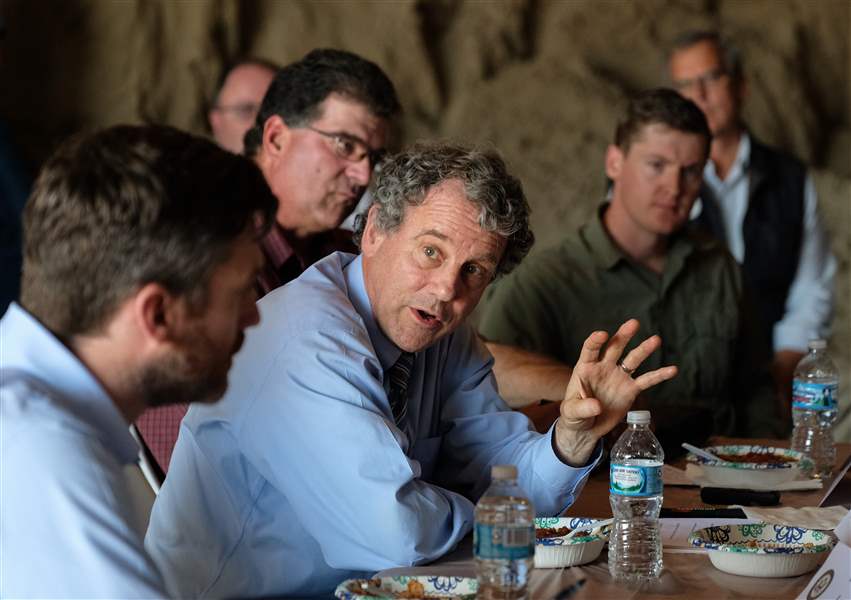
Local farmers offer input to Brown on conservation efforts
10/9/2017
U.S. Sen. Sherrod Brown talks with farmers, conservation groups, and sportsmen to discuss the federal farm bill Monday, October 9, in Oregon, Ohio.
THE BLADE/JEREMY WADSWORTH
Buy This Image
U.S. Sen. Sherrod Brown (D., Ohio) met Monday afternoon for about an hour and a half with Toledo-area farmers and others interested in agriculture and the ecology to discuss the effectiveness of current conservation efforts and how they’ll relate to an updated federal farm bill.
The senator held the roundtable at the Oregon farm of Bill Myers. Mr. Myers said, among other things, that land taken out of cultivation to create "buffer strips" that protect waterways from fertilizer runoff should be removed from property-tax rolls so farmers aren't paying taxes on land from which they derive no yields.
Other speakers described current federal programs to promote soil conservation and control agricultural pollution as vital to getting farmers started in such efforts, even if over time they no longer qualify for continuing funds.
Joe Nester, a soils agronomist who owns Bryan-based Nester Ag, said water-quality problems blamed on phosphorus fertilizer runoff from northwest Ohio and southeast Michigan farm fields may in part be an unintended consequence of power plants' compliance with the Clean Air Act.
Sulfur from "acid rain" that once fell downwind of coal-burning power plants helped keep phosphorus in the soil, Mr. Nester said. But now that power plants extract sulfur from their smoke, he explained, more of the phosphorus leaches out of the soil when it rains.
To counteract that, farmers like Mr. Myers are buying spent "scrubber stone" from power plants and treating their soil with it to bond with the phosphorus and keep it in the ground.
Behind the tables set up in Mr. Myers’ barn Monday was a 1,000-ton pile of that material — chemically known as calcium sulfate — that Mr. Myers said he trucks from the Detroit Edison power plant in Monroe to spread on the 2,100 acres he farms in Lucas and Ottawa counties.
It costs about $35 per acre to use, he said after the discussion, but enhanced crop yields more than pay for it — along with the ecological benefit.
Mr. Myers said political leaders need to “think differently on how we reach” farmers who don’t readily embrace conservation measures, while local variations in soil conditions work against one-size-fits-all solutions.
Wade Church of Whitehouse, representing the Ohio Farm Bureau Federation, said he’s leery of the Conservation Reserve Program becoming “a social program for farmers” when it induces some to take high-quality farmland out of production.
But overall, Mr. Church said, farmers increasingly understand that preventing soil erosion and ending wasteful, polluting use of fertilizers is good for their bottom lines as well as for the environment.
“Farmers are taking action, and they’re willing to do more,” said Tadd Nicholson, speaking on behalf of the Ohio Corn and Wheat Growers’ Association. He also urged the senator to make sure crop-insurance programs are preserved in the new farm bill.
Also at the table were representatives of several agricultural-service agencies and conservation groups like The Nature Conservancy and Ducks Unlimited.
Senator Brown said afterward the meeting reinforced his belief that federal conservation-related programs that the Trump administration's budget targets for cuts are valued by northwest Ohio farmers.
"This has been helpful," he said. "It lets me know the depth and breadth of support for these conservation programs."
The 2014 Federal Farm Bill set widespread Department of Agriculture policies and programs. The current bill expires Sept. 30, 2018.
Mr. Brown told the discussion group as well as several dozen others who looked on that the Senate Agriculture Committee hopes to have a new farm bill drafted by spring. He is the first Ohio senator to serve on that committee in half a century.
Contact David Patch at dpatch@theblade.com or 419-724-6094.